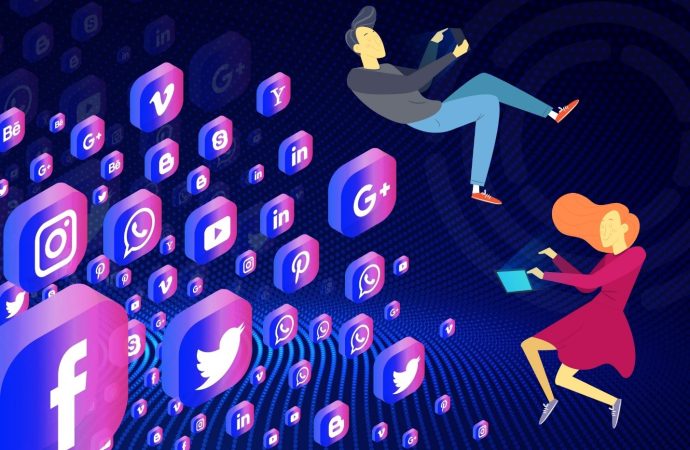The convergence of social media and the music industry has been a transformative phenomenon over the past decade. As we approach 2024, the relationship between these two entities continues to evolve, shaping the way music is produced, distributed, and consumed. This article delves into the multifaceted impact of social media on the music industry, offering
The convergence of social media and the music industry has been a transformative phenomenon over the past decade. As we approach 2024, the relationship between these two entities continues to evolve, shaping the way music is produced, distributed, and consumed. This article delves into the multifaceted impact of social media on the music industry, offering an informative outlook for the coming year.
The Evolution of Social Media in the Music Industry
Social media platforms like Facebook, Twitter, Instagram, TikTok, and YouTube have become indispensable tools for artists, record labels, and fans alike. The rise of these platforms has democratized the music industry, allowing independent artists to reach global audiences without the backing of major record labels. This democratization has led to an explosion of new talent and genres, enriching the musical landscape.
Discoverability and Virality
One of the most significant impacts of social media on the music industry is the enhanced discoverability of new music. Platforms like TikTok have become breeding grounds for viral hits. Songs like Lil Nas X’s “Old Town Road” and Olivia Rodrigo’s “Drivers License” gained massive popularity through viral challenges and user-generated content. In 2024, this trend shows no signs of slowing down. Artists and record labels are increasingly focusing on creating content that is not only musically appealing but also has the potential to go viral.
Direct Fan Engagement
Social media has also revolutionized the way artists engage with their fans. Platforms like Instagram and Twitter allow artists to share behind-the-scenes content, interact with fans, and build a personal brand. This direct engagement fosters a sense of community and loyalty among fans, which is invaluable for an artist’s long-term success. In 2024, we can expect to see more artists leveraging social media to create immersive fan experiences, from virtual meet-and-greets to exclusive content releases.
Monetization Strategies
The integration of social media and the music industry has also opened up new avenues for monetization. Traditional revenue streams like album sales and concert tickets are now supplemented by social media-driven income.
Streaming and Royalties
Streaming platforms like Spotify and Apple Music have become the primary means of music consumption. Social media plays a crucial role in driving streams, as artists and fans share playlists, songs, and albums across various platforms. In 2024, the focus will likely shift towards optimizing these shares for better royalty payouts. Artists and labels are expected to employ data analytics to understand which social media strategies yield the highest streaming numbers and, consequently, the highest royalties.
Brand Partnerships and Sponsorships
Another significant revenue stream is brand partnerships and sponsorships. Social media influencers and musicians often collaborate with brands for sponsored posts, product placements, and exclusive deals. These partnerships can be highly lucrative, offering artists another way to monetize their social media presence. In the coming year, we can expect more sophisticated and targeted brand collaborations, leveraging data analytics to ensure maximum ROI for both the artist and the brand.

Picture by: Yandex.com
Challenges and Ethical Considerations
While the impact of social media on the music industry has been largely positive, it is not without its challenges and ethical considerations.
Mental Health
The constant pressure to produce content and maintain an online presence can take a toll on an artist’s mental health. The quest for virality often leads to burnout, anxiety, and depression. As we move into 2024, there is a growing awareness of these issues, and both social media platforms and the music industry are expected to implement measures to support artists’ mental well-being.
Copyright and Intellectual Property
The ease of sharing music on social media also brings up concerns about copyright and intellectual property. Unauthorized use of music in user-generated content can lead to legal complications. In 2024, we can expect stricter regulations and more sophisticated algorithms to detect and manage copyright infringements.
The Role of Technology
Technological advancements are set to further integrate social media and the music industry. Augmented Reality (AR) and Virtual Reality (VR) are emerging as new frontiers for fan engagement and live performances. Imagine attending a virtual concert where you can interact with other fans and even the artist, all from the comfort of your home. These technologies are expected to gain more traction in 2024, offering innovative ways to experience music.
Artificial Intelligence and Data Analytics
Artificial Intelligence (AI) and data analytics are also playing a significant role in shaping the future of the music industry. AI can analyze social media trends to predict the next big hit, while data analytics can provide insights into fan behavior and preferences. These technologies enable artists and record labels to make data-driven decisions, optimizing everything from marketing strategies to tour planning.
Conclusion
As we look towards 2024, it is evident that social media will continue to have a profound impact on the music industry. From discoverability and fan engagement to monetization and technological advancements, the symbiotic relationship between social media and music is set to deepen. While challenges like mental health and copyright issues need to be addressed, the future looks promising, offering exciting opportunities for artists, record labels, and fans alike.
In summary, the integration of social media into the music industry has democratized access, diversified revenue streams, and introduced new ways to engage with music. As technology continues to evolve, so too will the ways in which we create, share, and experience music. The year 2024 promises to be a pivotal one, as both industries navigate this ever-changing landscape.
















